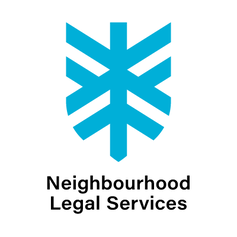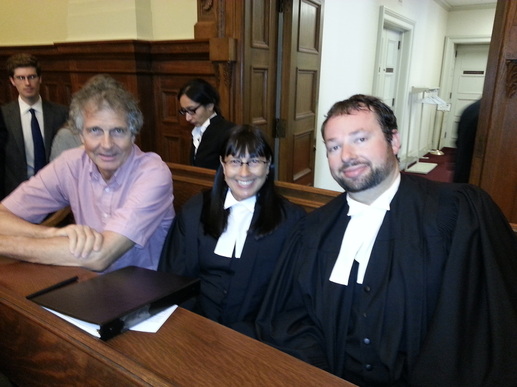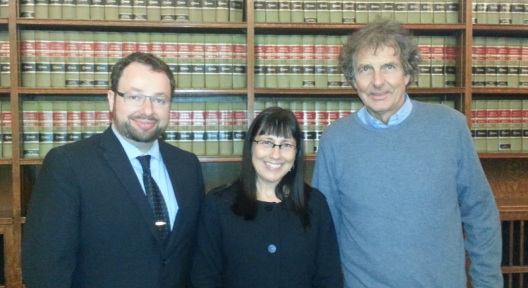|
Court Divided on Charter Right to Housing, Claimants Will Appeal (Toronto) - Today, the Ontario Court of Appeal released a divided ruling to homeless and inadequately housed Canadians in a landmark Charter challenge against the federal and provincial governments. In a strong dissent, Justice Kathryn Feldman, the most experienced judge on the panel, found that the application raises serious Charter claims of significant public importance. “It was an error of law to strike this claim at the pleadings stage. This application. . . has been brought forth by counsel on behalf of a large, marginalized, vulnerable and disadvantaged group. . . It raises issues that are basic to their life and well-being. It is supported by a number of credible intervening institutions with considerable expertise in Charter jurisprudence and analysis. The appellants put together a significant record to support their application. That record should be put before the court,” Justice Feldman stated in the decision. “It is distressing that the province has made elimination of homelessness a core part of their Poverty Reduction Strategy, yet continue to oppose this legal case rather than advocate for a national housing strategy,” asserts Avvy Go from Colour of Poverty/Colour of Change Network, one of eight intervenor groups that argued for the importance of allowing the case to proceed during the Ontario Court of Appeal hearing in May. Other intervenor groups included the coalition of the Charter Committee on Poverty, Pivot Legal Society and Justice for Girls which were represented by NLS, as well as Amnesty International, Ontario Human Rights Commission, LEAF (Women’s Legal Education and Action Fund), and several legal clinics. In 2010, The Centre for Equality Rights in Accommodation (CERA) and four individual applicants filed the case, seeking a court order requiring the provincial and federal governments to implement provincial and national housing strategies. They argued that Canada and Ontario have violated their rights under Sections 7 and 15 of the Canadian Charter of Rights and Freedoms. Physicians, academics and international human rights experts provided almost 10,000 pages of evidence to support the claim, but a motion to strike would prevent any of this evidence from being heard in court. “Housing is a fundamental human right,” asserts Janice Arsenault, one of the applicants in the case. “I’m involved in this case not just for myself. I want to fight for this right for my family, and for everyone in Canada.” Homelessness in Canada has reached crisis levels, yet Canada remains the only G8 country without a national housing strategy. The applicants will seek leave to appeal to the Supreme Court of Canada. Click here for the full text of the decision Scroll to the bottom of this post for links to all the documents filed in this case. 6/3/2014 UPDATE: On May 26 to 28, NLS lawyer Benjamin Ries and University of Ottawa Professor Martha Jackman did an exceptional job representing the intervenors Charter Committee on Poverty Issues, Pivot Legal Society, and Justice for Girls at the Court of Appeal for Ontario in the Right to Housing case (see below for details). The Appeal panel, comprised of Justices Feldman, Strathy and Pardu, heard extensive argument from the homeless and inadequately housed applicants, and from an unprecedented eight intervenors. The applicants and intervenors raised some novel arguments, including a fresh approach to Charter litigation that looks at systemic effects and discrimination rather than looking at discrete provisions in the law that might be unconstitutional. They also explored the interplay of international law obligations and Charter issues. The court also heard from the Governments of Ontario and Canada, both of whom have maintained the position that they would like to court to dismiss the appeal and the entire case without hearing any evidence. Given the length of the hearing, and the complexity and importance of the constitutional questions at stake, the court understandably reserved its judgement. We'll keep you posted on any further developments. In the mean time, you can explore the links at the bottom of this blog to read the written materials filed in relation to this case. 04/02/2014 On March 28, 2014, NLS appeared at the Ontario Court of Appeal as co-counsel for the Charter Committee on Poverty Issues, Pivot Legal Society, and Justice for Girls on a motion to be granted intervenor status in the Right to Housing case. In an endorsement released March 31, our motion was granted. Congratulations to our lawyer Ben Ries and co-counsel Professor Martha Jackman on their hard work and success!
By taking on this case, NLS will be able to bring the unique and nuanced perspectives of the intervenors we represent to assist the court in making its decision in this important case. What is the Right to Housing Case? Formally Tanudjaja et al v. Attorney General of Canada and Attorney General of Ontario, the Right to Housing case is fundamentally important in pushing the governments of Canada and Ontario to recognize and realize constitutional and international law rights with respect to housing. In 2010 the Advocacy Centre for Tenants Ontario (ACTO) filed an application in Superior Court on behalf of 4 precariously housed and homeless individuals, and on behalf of the Centre for Equality Rights in Accommodation (CERA). The application alleged that the Governments of Canada and Ontario were in breach of their legal obligations under the Charter of Rights and Freedoms and under international law by failing to put in place a comprehensive strategy to address the affordable housing and homelessness crisis in the country. Specifically, the application alleges that the harm caused by this failure breaches the rights of the applicants under s. 7 (the right to life, liberty and security) and s. 15 (equality rights) of the Charter. The application also alleges that these harms are not justifiable under s. 1 of the Charter, a section designed to give the government an opportunity to justify Charter violations. In May, 2012, the Attorney Generals of Canada and Ontario brought a motion to dismiss ACTO’s application without a full hearing, arguing that the application had “no reasonable prospect of success” and therefore, did not meet the legal test for proceeding to a full hearing. A lengthy hearing was held over 3 consecutive days in May, 2013, where the court heard from the parties and three intervenors. Justice Thomas Lederer’s lengthy decision granted the Attorney Generals’ motion and dismissed the application. The decision to dismiss the application without a full hearing was roundly criticized, including by housing, homelessness, anti-poverty and human rights advocates. The applicants have now taken advantage of their right to appeal such a decision to the Ontario Court of Appeal. The hearing of the appeal has been set for May 26-27, 2014. Further Information: Frequent updates and all facta, affidavits and other documents related to the case (from the Superior Court as well as the Court of Appeal) can be found at the following links: Social Rights in Canada Advocacy Centre for Tenants Ontario Comments are closed.
|
The NLS BlogOur blog shares information with our community on legal developments and other important issues. As such we hope you'll find this blog informative - and maybe even fun. Categories
All
|
Powered by
 Create your own unique website with customizable templates.
Create your own unique website with customizable templates.
 Create your own unique website with customizable templates.
Create your own unique website with customizable templates.



